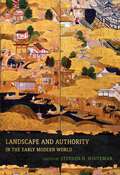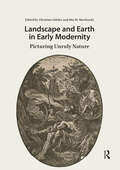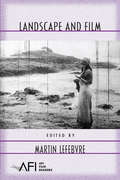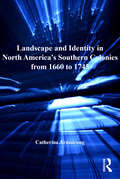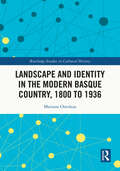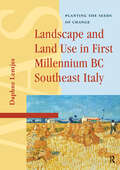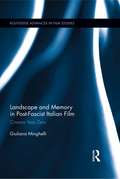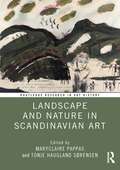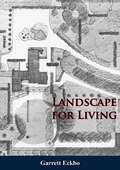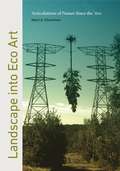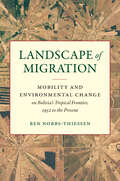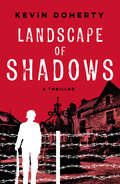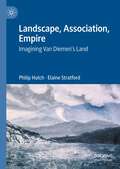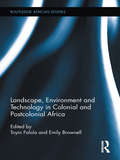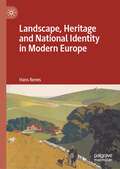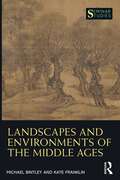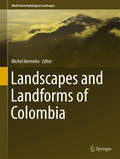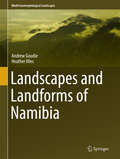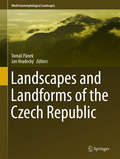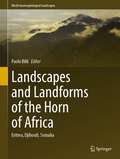- Table View
- List View
Landscape Turned Red: The Battle of Antietam
by Stephen W. Sears&“The best account of the Battle of Antietam&” from the award-winning, national bestselling author of Gettysburg and Chancellorsville (The New York Times Book Review). The Civil War battle waged on September 17, 1862, at Antietam Creek, Maryland, was one of the bloodiest in the nation&’s history: in this single day, the war claimed nearly 23,000 casualties. In Landscape Turned Red, the renowned historian Stephen Sears draws on a remarkable cache of diaries, dispatches, and letters to recreate the vivid drama of Antietam as experienced not only by its leaders but also by its soldiers, both Union and Confederate. Combining brilliant military analysis with narrative history of enormous power, Landscape Turned Red is the definitive work on this climactic and bitter struggle. &“A modern classic.&” —The Chicago Tribune &“No other book so vividly depicts that battle, the campaign that preceded it, and the dramatic political events that followed.&” —The Washington Post Book World &“Authoritative and graceful . . . a first-rate work of history.&” —Newsweek
Landscape and Authority in the Early Modern World (Penn Studies in Landscape Architecture)
by John Dixon HuntCourts and societies across the early modern Eurasian world were fundamentally transformed by the physical, technological, and conceptual developments of their era. Evolving forms of communication, greatly expanded mobility, the spread of scientific knowledge, and the emergence of an increasingly integrated global economy all affected how states articulated and projected visions of authority into societies that, in turn, perceived and responded to these visions in often contrasting terms. Landscape both reflected and served as a vehicle for these transformations, as the relationship between the land and its imagination and consumption became a fruitful site for the negotiation of imperial identities within and beyond the precincts of the court.In Landscape and Authority in the Early Modern World, contributors explore the role of landscape in the articulation and expression of imperial identity and the mediation of relationships between the court and its many audiences in the early modern world. Nine studies focused on the geographical areas of East and South Asia, the Islamic world, and Europe illuminate how early modern courts and societies shaped, and were shaped by, the landscape, including both physical sites, such as gardens, palaces, cities, and hunting parks, and conceptual ones, such as those of frontiers, idealized polities, and the cosmos.The collected essays expand the meaning and potential of landscape as a communicative medium in this period by putting an array of forms and subjects in dialogue with one another, including not only unique expressions, such as gardens, paintings, and manuscripts, but also the products of rapidly developing commercial technologies of reproduction, especially print. The volume invites a deeper and more nuanced understanding of the complexity with which early modern states constructed and deployed different modes of landscape for different audiences and environments.Contributors: Robert Batchelor, Seyed Mohammad Ali Emrani, John Finlay, Caroline Fowler, Katrina Grant, Finola O’Kane, Anton Schweizer, Larry Silver, Stephen H. Whiteman.
Landscape and Change in Early Medieval Italy
by Paolo SquatritiThis innovative environmental history of the long-lived European chestnut tree and its woods offers valuable new perspectives on the human transition from the Roman to the medieval world in Italy. Integrating evidence from botanical and literary sources, individual charters and case studies of specific communities, the book traces fluctuations in the size and location of Italian chestnut woods to expose how early medieval societies changed their land use between the fourth and eleventh centuries, and in the process changed themselves. As the chestnut tree gained popularity in late antiquity and became a valuable commodity by the end of the first millennium, this study brings to life the economic and cultural transition from a Roman Italy of cities, agricultural surpluses and markets to a medieval Italy of villages and subsistence farming.
Landscape and Earth in Early Modernity: Picturing Unruly Nature (Visual and Material Culture, 1300-1700)
by Christine Göttler Mia M. MochizukiEarly modern views of nature and the earth upended the depiction of land. Landscape emerged as a site of artistic exploration at a time when environments and ecologies were reshaped and transformed. This volume historicizes the contingency of an ever-changing elemental world, reframing and reimagining landscape as a mediating space in the interplay between the natural and the artificial, the real and the imaginary, the internal and the external. The lens of the “unruly” reveals the latent landscapes that undergirded their conception, the elemental resources that resurfaced from the bowels of the earth, the staged topographies that unsettled the boundaries between nature and technology, and the fragile ecologies that undermined the status quo of human environs. Landscape and Earth in Early Modernity: Picturing Unruly Nature argues for an art history attentive to the vicissitudes of circumstance and attributes the regrounding of representation during a transitional age to the unquiet landscape.
Landscape and Film (AFI Film Readers)
by Martin LefebvreFirst published in 2006. Routledge is an imprint of Taylor & Francis, an informa company.
Landscape and Identity in North America's Southern Colonies from 1660 to 1745
by Catherine ArmstrongThrough an analysis of textual representations of the American landscape, this book looks at how North America appeared in books printed on both sides of the Atlantic between the years 1660 and 1745. A variety of literary genres are examined to discover how authors described the landscape, climate, flora and fauna of America, particularly of the new southern colonies of Carolina and Georgia. Chapters are arranged thematically, each exploring how the relationship between English and American print changed over the 85 years under consideration. Beginning in 1660 with the impact of the Restoration on the colonial relationship, the book moves on to show how the expansion of British settlement in this period coincided with a dramatic increase in the production and consumption of the printed word and the further development of religious and scientific explanations of landscape change and climactic events. This in turn led to multiple interpretations of the American landscape dependent on factors such as whether the writer had actually visited America or not, differing purposes for writing, growing imperial considerations, and conflict with the French, Spanish and Natives. The book concludes by bringing together the three key themes: how representations of landscape varied depending on the genre of literature in which they appeared; that an author's perceived self-definition (as English resident, American visitor or American resident) determined his understanding of the American landscape; and finally that the development of a unique American identity by the mid-eighteenth century can be seen by the way American residents define the landscape and their relationship to it.
Landscape and Identity in the Modern Basque Country, 1800 to 1936 (Routledge Studies in Cultural History)
by Maitane OstolazaLandscape and Identity in the Modern Basque Country, 1800 to 1936 studies the relationship between landscape and modern identities in the Basque Country. Using an interdisciplinary approach that combines cultural history and geography, it analyses the process of historical construction of the Basque landscape, highlighting its multiple political, social and cultural meanings. The book is divided into two parts: the first examines the discourses, images and representations of the Basque landscape; the second examines landscape practices through tourism, hiking and mountaineering. Focusing on the Basque case but establishing numerous connections with comparable phenomena in Western Europe, the book demonstrates that the landscape became a structuring element insofar as it helped shape individual identities while participating in the creation of social links. This book examines the processes of identity construction "from below" by means of new interpretative tools, such as the experience of landscape. This work, originally published in French, brings to an English-speaking audience a crucial issue in the modern history of the Basque Country, namely the cultural construction of a collective identity within the framework of a nation-state, such as Spain, confronted with multiple territorial identities. Approaching this question from the perspective of landscape provides new keys to understanding the processes of nation-building that occurred in Europe in the nineteenth and twentieth centuries.
Landscape and Land Use in First Millennium BC Southeast Italy: Planting the Seeds of Change (Amsterdam Archaeological Studies)
by Daphne LentjesThis book offers a comprehensive overview of landscape and land use in southeast Italy in the first millennium BCE. Using the most up-to-date techniques, it combines archaeobotanical and archaeozoological data with information from excavations, field surveys, and ancient written texts to place the relationship between people and landscapes in a broad geographical and chronological framework. It also confronts questions of food habits, the scale and organisation of agricultural production, the influx of Greek and Roman colonists, and the effects of globalisation on local and regional land use.
Landscape and Memory in Post-Fascist Italian Film: Cinema Year Zero (Routledge Advances in Film Studies)
by Giuliana MinghelliThis study argues that neorealism’s visual genius is inseparable from its almost invisible relation to the Fascist past: a connection inscribed in cinematic landscapes. While largely a silent narrative, neorealism’s complex visual processing of two decades of Fascism remains the greatest cultural production in the service of memorialization and comprehension for a nation that had neither a Nuremberg nor a formal process of reconciliation. Through her readings of canonical neorealist films, Minghelli unearths the memorial strata of the neorealist image and investigates the complex historical charge that invests this cinema. This book is both a formal analysis of the new conception of the cinematic image born from a crisis of memory, and a reflection on the relation between cinema and memory. Films discussed include Ossessione (1943) Paisà (1946), Ladri di biciclette (1948), and Cronaca di un amore (1950).
Landscape and Nature in Scandinavian Art (Routledge Research in Art History)
by MaryClaire PappasThis edited volume foregrounds new and vital scholarship shaping Scandinavian art historical research on the representations of the natural world.Contributors deconstruct the interlinking of people and land through critical readings of the Scandinavian representation of nature, bringing to the fore how the traditional focus on the landscape as a manifestation of temperament has tended to obfuscate critical approaches to the representation of the landscape. Making interdisciplinary connections, this volume redresses the imbalance in scholarship on the region that often emphasizes teleological national narratives and instead situates encounters with nature and the landscape in relationship to more interdisciplinary perspectives. Each chapter serves as a specific case study on topics ranging from circumpolar exploration and colonial practices, deconstructing National Romanticism myths, and contemporary artistic responses to the history of the politics of land.The book will be of interest to scholars working in art history, visual culture, nature studies, and environmental history.
Landscape and the Arts in Early Modern Italy: Theatre, Gardens and Visual Culture (Visual and Material Culture, 1300-1700)
by Katrina GrantLandscape and the Arts in Early Modern Italy: Theatre, Gardens and Visual Culture argues that theatre, and the new genre of opera in particular, played a key role in creating a new vision of landscape during the long seventeenth century in Italy. It explores how the idea of gardens as theatres emerged at the same time as opera was developed in Italian courts around the turn of the seventeenth century. During this period landscape painting emerged as a genre and the aesthetic of designed landscapes and gardens was wholly transformed, which resulted in a reconceptualization of the relationship between humans and landscape. The importance of theatre as a key cultural expression in Italy is widely recognised, but the visual culture of theatre and its relationship to the broader artistic culture is still being untangled. This book argues that the combination of narratives playing out in natural settings (Arcadia, Parnassus, Alcina), the emotional responses elicited by sets and special effects (the apparent magical manipulation of the laws of nature), and, the way that garden theatres were used for displays of power and to enact princely virtue and social order, all contributed to this shifting idea of landscape in the seventeenth century.
Landscape for Living
by Garrett EckboThis seminal work essentially defined Modern landscape architecture. Eckbo saw landscape design as a vehicle for social change by breaking down the boundaries between indoor and outdoor living. Throughout Eckbo's career he maintained his vision of the interaction of art and science to create environments that were functional and livable, while maintaining the social, ecological and cultural approach to design.-Print ed.“One of the central figures in modern landscape architecture, Garrett Eckbo (1910-2000) was a major influence in the field during an active career spanning five decades. While most of the early American designers concentrated on the private garden and the corporate landscape, Eckbo's work demonstrated innovative design ideas in a social setting. This engagement with social improvement has stayed with Eckbo throughout his life, distinguishing both his intentions and achievements, from his early work for the Farm Security Administration to his partnerships (including one of the most prominent landscape firms in the world, Eckbo, Dean, Austin, and Williams—EDAW) and his years as chair of the Department of Landscape Architecture at the University of California, Berkeley.”-Marc Treib
Landscape into Eco Art: Articulations of Nature Since the ’60s
by Mark CheethamDedicated to an articulation of the earth from broadly ecological perspectives, eco art is a vibrant subset of contemporary art that addresses the widespread public concern with rapid climate change and related environmental issues. In Landscape into Eco Art, Mark Cheetham systematically examines connections and divergences between contemporary eco art, land art of the 1960s and 1970s, and the historical genre of landscape painting.Through eight thematic case studies that illuminate what eco art means in practice, reception, and history, Cheetham places the form in a longer and broader art-historical context. He considers a wide range of media—from painting, sculpture, and photography to artists’ films, video, sound work, animation, and installation—and analyzes the work of internationally prominent artists such as Olafur Eliasson, Nancy Holt, Mark Dion, and Robert Smithson. In doing so, Cheetham reveals eco art to be a dynamic extension of a long tradition of landscape depiction in the West that boldly enters into today’s debates on climate science, government policy, and our collective and individual responsibility to the planet.An ambitious intervention into eco-criticism and the environmental humanities, this volume provides original ways to understand the issues and practices of eco art in the Anthropocene. Art historians, humanities scholars, and lay readers interested in contemporary art and the environment will find Cheetham’s work valuable and invigorating.
Landscape into Eco Art: Articulations of Nature Since the ’60s
by Mark CheethamDedicated to an articulation of the earth from broadly ecological perspectives, eco art is a vibrant subset of contemporary art that addresses the widespread public concern with rapid climate change and related environmental issues. In Landscape into Eco Art, Mark Cheetham systematically examines connections and divergences between contemporary eco art, land art of the 1960s and 1970s, and the historical genre of landscape painting.Through eight thematic case studies that illuminate what eco art means in practice, reception, and history, Cheetham places the form in a longer and broader art-historical context. He considers a wide range of media—from painting, sculpture, and photography to artists’ films, video, sound work, animation, and installation—and analyzes the work of internationally prominent artists such as Olafur Eliasson, Nancy Holt, Mark Dion, and Robert Smithson. In doing so, Cheetham reveals eco art to be a dynamic extension of a long tradition of landscape depiction in the West that boldly enters into today’s debates on climate science, government policy, and our collective and individual responsibility to the planet.An ambitious intervention into eco-criticism and the environmental humanities, this volume provides original ways to understand the issues and practices of eco art in the Anthropocene. Art historians, humanities scholars, and lay readers interested in contemporary art and the environment will find Cheetham’s work valuable and invigorating.
Landscape of Migration: Mobility and Environmental Change on Bolivia's Tropical Frontier, 1952 to the Present (Flows, Migrations, and Exchanges)
by Ben Nobbs-ThiessenIn the wake of a 1952 revolution, leaders of Bolivia's National Revolutionary Movement (MNR) embarked on a program of internal colonization known as the "March to the East." In an impoverished country dependent on highland mining, the MNR sought to convert the nation's vast "undeveloped" Amazonian frontier into farmland, hoping to achieve food security, territorial integrity, and demographic balance. To do so, they encouraged hundreds of thousands of Indigenous Bolivians to relocate from the "overcrowded" Andes to the tropical lowlands, but also welcomed surprising transnational migrant streams, including horse-and-buggy Mennonites from Mexico and displaced Okinawans from across the Pacific.Ben Nobbs-Thiessen details the multifaceted results of these migrations on the environment of the South American interior. As he reveals, one of the "migrants" with the greatest impact was the soybean, which Bolivia embraced as a profitable cash crop while eschewing earlier goals of food security, creating a new model for extractive export agriculture. Half a century of colonization would transform the small regional capital of Santa Cruz de la Sierra into Bolivia's largest city, and the diverging stories of Andean, Mennonite, and Okinawan migrants complicate our understandings of tradition, modernity, foreignness, and belonging in the heart of a rising agro-industrial empire.
Landscape of Shadows
by Kevin DohertyThe Choice: One Killer? Or Ten Innocents?France, 1941. The small town of Dinon is under German occupation. Max Duval, its mayor, appears to have accepted the German presence and encourages his citizens to do the same. He owns the Hotel Picardie, whose most important resident is Major Egon Wolff— German commandant.Then, a Resistance team kills two German troopers, and the uneasy calm of Dinon is shattered. One of the assassins, the headstrong and beautiful Sophie Carriere, takes refuge in the Hotel Picardie. Despite his disapproval of the assassinations, Max keeps her safe. Sophie accuses Max of conspiring the attacks, but Max is no collaborator— he has his own secret methods of resistance, which Sophie has now jeopardized.Danger escalates when Sophie discovers the truth about Max' s resistance work, and she and Max are drawn to one another. Egon Wolff decrees that ten citizens will be executed unless the missing assassin is surrendered. Max faces a terrible choice: sacrifice Sophie and betray the cause of freedom for which they are both working— or let innocent citizens go to their deaths.Perfect for fans of Leon Uris and Alan Furst
Landscape, Association, Empire: Imagining Van Diemen’s Land
by Elaine Stratford Philip HutchThis book tells a compelling story about invasion, settler colonialism, and an emergent sense of identity in place, as seen through topographical and landscape images by seven fascinating artists. Their ways of imagining the Vandemonian landscape are part of a much larger story about how aesthetic forces shaped empire and colony, place and migration, and people’s lives. They remain intriguing through-lines of global significance and local meaning.
Landscape, Environment and Technology in Colonial and Postcolonial Africa (Routledge African Studies)
by Toyin Falola Emily BrownellThis volume seeks to identify and examine two categories of colonial and postcolonial knowledge production about Africa. These two broad categories are "environment" and "landscape," and both are useful and problematic to explore. Discussions about African environments often concentrate on Africans as perpetrators of their own land, causing degradation from lack of knowledge and technology. "Landscape" defines the category of knowledge produced by foreigners about Africa, where Africans remain part of the scenery and yield no agency over their surroundings. To flesh out these categories and explore their creation and how they have been deployed to shape colonial and postcolonial discourses on Africa, this volume investigates the "technological pastoral," the points of convergence and conflict between Western notions of pastoral Africa and the introduction of colonial technology, scientific ideas and commodification of land and animals.
Landscape, Heritage and National Identity in Modern Europe
by Hans RenesThis book describes the way in which landscape and landscape heritage have been – and still are – used to define national identities. It shows how national narratives use different types of landscapes. Some nations use nature as their main point of reference, partly to circumcise conflicts between different ethnic groups. Other nations use agrarian landscapes, that are often describes as timeless and ‘rooted’. Again other nations use history as a major sources for defining identities. In these cases, myths of origins, ‘Golden Ages’ or wars and conflicts deliver the materials for national narratives. The final section describes how nation states developed new urban as well as rural landscapes as national showpieces. As landscapes are an important but under-researched aspect of nation-building, this book fills a gap in the study of nationalism.
Landscape, Nature, and the Sacred in Byzantium
by Veronica Della DoraNature is as much an idea as a physical reality. By 'placing' nature within Byzantine culture and within the discourse of Orthodox Christian thought and practice, Landscape, Nature and the Sacred in Byzantium explores attitudes towards creation that are utterly and fascinatingly different from the modern. Drawing on Patristic writing and on Byzantine literature and art, the book develops a fresh conceptual framework for approaching Byzantine perceptions of space and the environment. It takes readers on an imaginary flight over the Earth and its varied topographies of gardens and wilderness, mountains and caves, rivers and seas, and invites them to shift from the linear time of history to the cyclical time and spaces of the sacred - the time and spaces of eternal returns and revelations.
Landscapes and Environments of the Middle Ages (Seminar Studies)
by Kate Franklin Michael BintleyThis book is a comprehensive introduction to the landscapes of the Middle Ages within and beyond Europe, paying close attention to the relationship between ‘real’ and imagined landscapes and the ways that medieval people made and inhabited their world. Rather than studying 'nature' in the Middle Ages, the book instead examines the spaces that people constructed through soil, stone, and song; water and wasteland; plants and animals; and timber, textiles, and texts, which in turn made up the medieval world. Likewise, the text emphasises a definition of environment that focuses on ‘living with’, inviting readers to think about the more-than-human worlds that medieval people depended on, cared for, constructed, and damaged. Bringing together a wide range of primary source material, including evidence from texts, material culture, and visual arts, the book reflects the diversity of landscapes and human responses to them throughout the course of this period and considers the role that these medieval worlds have played in shaping the modern, both physically and culturally. Landscapes and Environments of the Middle Ages is an excellent resource for both undergraduate and postgraduate students in medieval studies and history, offering interdisciplinary, transhistorical, and transnational insights into this period of immense change and innovation.
Landscapes and Landforms of Colombia
by Michel HermelinThis book provides an attractive and informative overview of Colombian landscapes and their geological evolution, including comprehensive descriptions of seventeen key selected sites in the country. It provides insight into the geomorphological diversity of Colombian landscapes characterized by climatic and topographic variation. The book covers the essence of the landscapes in the country: coastal features, mud volcanoes, desertic geoforms, snow covered peaks, active volcanoes, deeply incised canyons and subdesertic valleys. It contributes knowledge and understanding into Colombian landscapes and prospects.
Landscapes and Landforms of Namibia
by Andrew Goudie Heather VilesThe landscapes of Namibia are of world-class quality in beauty, diversity and interest. This book provides the first ever overview of the most important of these landscapes, explains why they look as they do, and evaluates why they are of note. Writing from a geomorphological perspective, the authors introduce the key processes and controls which influence landscape and landform development in Namibia. Geological and tectonic background, climate now and in the past, vegetation and animals (including humans) are all identified as crucial factors influencing the landscape of Namibia today. The book presents twenty one richly-illustrated case studies of the most significant landscapes of Namibia, ranging from the iconic Etosha Pan at the heart of the biggest wildlife conservation area in the north, to the famous dunes and ephemeral river at Sossus Vlei in the heart of the Namib desert. Each case study also contains a full list of the key references to the scientific work on that landscape. The authors provide an assessment of the current state of conservation of these landscapes, and their importance to tourism. The book is recommended reading for anyone with a professional or amateur interest in the spectacular and intriguing landscapes of this part of southern Africa. It provides a useful handbook for those travelling around Namibia, and an invaluable reference guide for those interested in how landscapes develop and change.
Landscapes and Landforms of the Czech Republic
by Tomáš Pánek Jan HradeckýThe book aims to present the unique geomorphological landscapes of the Czech Republic. The geomorphic uniqueness of this country benefits from the proximity to two distinct European geological domains: the old cratonized Bohemian Massif and the relatively young Tertiary fold and thrust belt of the Western Carpathians. Landscapes and Landforms of the Czech Republic introduces general physiographical characteristics of the landscape and presents the main driving factors leading to the evolution of the present landscape. The book contains twenty two chapters describing the most interesting geomorphic landscapes of the Czech Republic. The selection of individual landscapes was based on visual exceptionality (e. g. sandstone landscapes of the Northern Bohemia), scientific importance (e. g. patterned grounds in the Sudetic Mountains) and historical relevance (e. g. mining of the Nízký and Hrubý Jeseník Mountains). The final chapters of the book discuss the protection of geomorphic heritage in the Czech Republic.
Landscapes and Landforms of the Horn of Africa: Eritrea, Djibouti, Somalia (World Geomorphological Landscapes)
by Paolo BilliThis book focuses on regions for which until now the geomorphology was very poorly studied and relatively unknown. Nevertheless, the landforms and landscapes of the Horn of Africa are highly attractive, diverse and in a few cases unique, since they span very different environments, from highland plateaus and mountains to lowlands (even below sea level) and coastlines with a high degree of diversity and from monsoon to arid climate conditions. The main topics addressed in the book include the links between the geological evolution and the current large scale geomorphology of the Horn of Africa; the large differences between the highlands and lowlands climate, river hydrology and their variation through time within a climate change perspective. This part of the world was home of the very first hominids. The landscape in which they lived and evolved throughout the Pleistocene is described in comparison with the arid and inhospitable, though immensely scenic, environment of today. Perennial and ephemeral rivers with very different morphology, processes, and hydrology drain the area, and, in combination with the past and recent uplift, substantially contributed to provide the region with peculiar landscapes and landforms. Long lasting weathering and erosion processes result in a typical inselberg landscape such as the Bur region, or the currently exposed flatland of old peneplain surfaces. Their changes through time, induced by both natural and anthropogenic factors, are addressed by a couple of case studies. Though the region has few inhabitants, they had to struggle to find their livelihood in a land that offers poor resources. This resulted in landscape change and land degradation. Examples of human impact on the landscape are presented at different scales. This book provides readers interested in geography and geomorphology with essential scientific and educational information on the Landscapes and Landforms of Eritrea, Djibouti and Somalia through simple, though scientifically, rigorous texts illustrated with several color maps and photos. One main prerogative of this book is therefore to give an insight into a region of the world where, for geographical and historical constraints, geomorphological investigation was very limited, thus enriching its intrinsic informative value.

